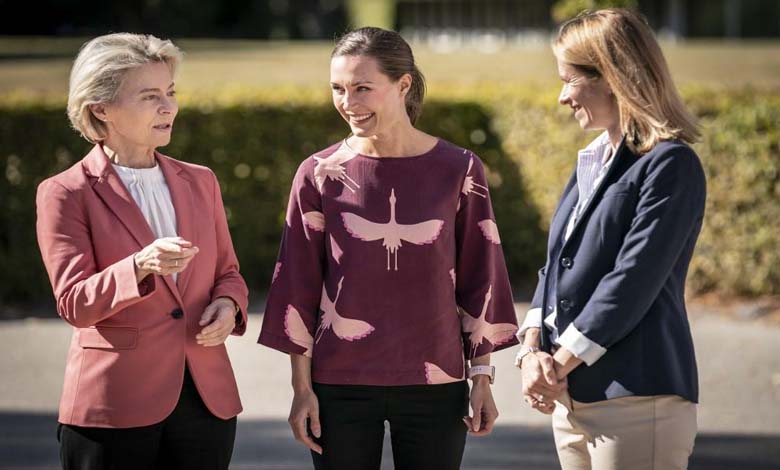Three Women Vie for Europe’s Throne: “The Calm,” “The Talented,” and “The Strict”

In a world fraught with dangers, Europe finds itself in urgent need of cohesive leadership at the European Union level.
To achieve this, Europe needs two things :
- Keeping far-right extremists out of power.
- Success partly depends on the choices of three women: Ursula von der Leyen, President of the European Commission; Giorgia Meloni, Prime Minister of Italy; and Marine Le Pen, the leading French populist.
The risks facing Europe are embodied in Ukraine, where the most bloody war on the continent since 1945 is raging, and what the continent sees as a “Russian threat” in the Baltic region, as well as the possibility of Donald Trump’s return in the upcoming US elections, which could “undermine” NATO, the cornerstone of European security.
Not to mention the continent’s economy being exposed to shocks from industrial and protectionist policies elsewhere, and populist Eurosceptics making high gains in opinion polls.
Ursula von der Leyen’s Chances
Back to the three women, von der Leyen has led the executive arm of the European Union since 2019 and is running for a second term.
“The Economist” says von der Leyen has done well, organizing the EU’s strong collective response to Russia, and helping deepen European integration at a critical time, for instance by pushing a pioneering joint debt issuance program.
Ursula von der Leyen, the calm German conservative, placed the European Commission at the heart of decision-making when French-German relations were tense.
To win a second term, she first needs the support of the 27 EU leaders. Then she must get a majority in the European Parliament, which will hold elections from June 6 to 9.
Starting tomorrow, about 375 million EU citizens will vote in elections to decide the 720 members of the next Parliament.
In theory, von der Leyen would enjoy the support of the conservative, liberal, and socialist groups that make up the political establishment.
But because politics has become highly fragmented, these three groups together are expected to win a narrow majority of seats, and some of their members in Parliament might break ranks.
Von der Leyen barely secured her first vote in 2019. But victory this time is not guaranteed, according to the newspaper.
As for Giorgia Meloni, she has been Italy’s Prime Minister since 2022 and leads the far-right “Brothers of Italy” party, which has transitioned from a rebellious force to running the country.
Meloni, a native of Rome, is expected to perform well in the EU elections.
With her support, von der Leyen could have a better chance of winning a parliamentary majority for a second term in the EU’s top job, especially since she had flattered the Italians last month by saying, “I have worked very well with Giorgia Meloni.”
These words, and the idea of what kind of alliance might exist between them, angered liberals and other European figures, including some in Germany’s ruling “Social Democratic Party” and Emmanuel Macron‘s party in France.
For them, Meloni, described as a talented orator, crosses acceptable boundaries and lends credibility to racist conspiracy theories like the “Great Replacement,” and she had compared the European Union to the Soviet Union.
This is why some see Meloni as a far-right figure who should be excluded from decision-making.
But excluding her would be, according to the newspaper, short-sighted. Her track record is not one of a political arsonist.
The Italian Prime Minister has found common ground with von der Leyen on issues such as illegal immigration, making joint visits to North African countries and striking agreements to halt the flow of migrants.
She has also been a strong supporter of Ukraine, unlike some of her populist right-wing colleagues.
Moreover, reaching an agreement with her could have the added benefit of splitting the populist right between its more moderate and extreme elements.
Le Pen
Lastly, there is Marine Le Pen, characterized by her strictness and strong belief in her destiny. Her far-right, anti-immigrant party “National Rally” is expected to perform well in the EU elections as well.
Le Pen has tried to reposition herself as a mainstream figure, despite being described as controversial with a long history of xenophobia.
She wants to create a large group of nationalists capable of pulling Europe strongly to the right. To do this, she wants to collaborate with Meloni.
This is why the British newspaper believes it is much better to pull Meloni towards the center instead.
This would thwart Le Pen’s plan and lead to the fragmentation of the far-right.
Weakening Le Pen could reduce her appeal in France, where her party leads opinion polls ahead of the 2027 elections.












